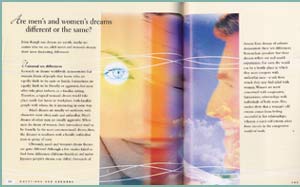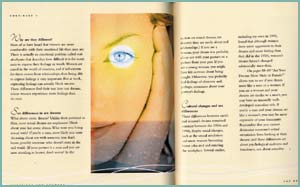 |
Excerpt
from:
Pages 84-87: |
![]()
 |
 |
Are
men's and women's dreams different or the same?
Even though our dreams are mostly
similar no matter who we are, adults identifying as male or female have dreams that show some
fascinating differences. (We do not yet have enough research to make conclusions about trans' people's dream content.)
Universal
sex differences
Research on dreams worldwide demonstrates
that women dream of people they know, who are equally likely to be male
or female. Interactions are equally likely to be friendly or aggressive,
but most likely indoors, in a familiar setting. Therefore, a typical woman's
dream would take place inside her home or workplace, with familiar people
with whom she is interacting in some way.
Men's dreams are usually set outdoors, with characters most often male and unfamiliar. Men's dreams of other men are usually aggressive. When men do dream of women, their interactions tend to be friendly. In the most common man's dream, then, the dreamer is outdoors with a hostile, unfamiliar man or group of men.
Obviously, men's and women's dream themes are quite different! Although a few studies failed to find these differences (African-American and native Japanese people's dreams may differ), thousands of dreams from dozens of cultures demonstrate these sex differences in dreams. Researchers speculate they reflect our real-world experience. For men, the world can be a hostile place in which they must compete with unfamiliar men—a task from which they may find relief with women. Women are most concerned with cooperative, harmonious relationships with individuals of both sexes. Also, studies show that a woman's self-esteem comes from feeling successful in her relationships, whereas a man's self-esteem arises from success in the competitive world of work.
Why
are they different?
Most
of us have heard that women are more comfortable with their emotional
life than are men. There is actually an emotional problem called male
alexthymia which describes how difficult it is for many men to express
their feelings in words! Women are raised in the world of emotion, and
if self-esteem for them comes from relationships, then being able to express
feelings is very important. But at work, expressing feelings can actually
block success. These differences find their way into our dreams, where
women experience more feelings than do men.
Sex
differences in sex dreams
What about erotic dreams? Unlike sex dreams
as they are portrayed in films, most sexual dreams are unpleasant! Think
about your last erotic dream. Who were you being sexual with? If you're
a man, most likely you were dreaming about sex with someone you don't
know, possibly someone who doesn't exist in the real world. (If your partner
is a man and you are now recoiling in horror, don't worry! In the section
on sexual dreams, we discover they are rarely about real relationships.)
If you are a woman, your dream was probably about sex with your partner
or a partner from your past. If you are a young woman, you might have
felt nervous about being caught. Otherwise, you probably had feelings
of closeness and, perhaps, uneasiness about your partner's feelings.
Cultural
changes and sex differences
These differences between men's and women's
dreams remained constant between the 1950s and 1990s, despite social changes:
the sexual revolution, more women becoming more educated, and more women
entering the workplace. Several studies, including my own in 1990, found
that although women show more aggression in their dreams and more feeling
than they did in the 1950s, women's dreams haven't changed much since
then.
On Pages 88-89 "Are Your Dreams More Male or Female?" allows you to see if you dream more like a male or female. If you identify as a woman and your dreams are similar to a man's, you may have an unusually well-developed masculine side. If you identify as a man and your dreams are like a woman's, you may be more expressive of your femininity. Remember that you cannot determine someone's sexual orientation from looking at their dreams, and these differences are about psychological maleness and femaleness, not about sexuality.